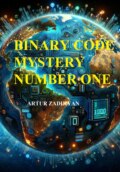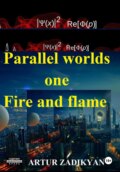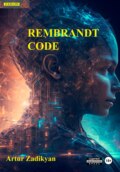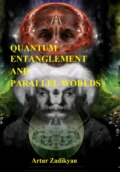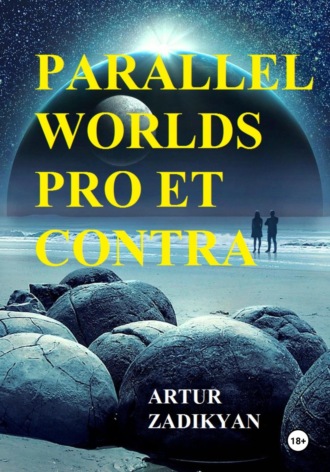
Artur Zadikyan
Parallel Worlds pro et contra
Ruthra realized his mistake again. The holy of holies, the place where the supercomputer was installed, was the same here as in his world. And it was already a fact, for this bunker was functioning. In the new world of undergrounds there were now new cities, capitals, suburbs. And there, on the surface – something like before in space. It would be dangerous to go up there.
– Okay, okay, I hear you. A little bit really confused. Anyway, the first and inevitable stage has passed. Let's assemble the staff, get to work.
– Is that an order? – The chief security officer asked.
– Orders," Ruthra said firmly.
– Yes," the military reported.
The chief of staff left, and the chief of security approached Rutra and, taking his hand, gestured for him to step back. As they stepped back, he said to him almost in a whisper:
– We have some preliminary results from here.
He gestured to the hall below, where monitoring and analysis was constantly going on.
– You can request it through Irene, but there is a danger. So I will ask you to restrict certain functions a bit… and certainly, I assure you, I will have to disable the ability to customize that madam over there.
He pointed at one of the ladies.
– Unfold the details.
– The president didn't shut down communication between systems.
– And who is?
– Unknown caller.
– What do you mean?
– A new admin has been brought into the system.
– How and who?
– You were the one who originally nominated him. Remember, I refused to endorse.
Rutra, as they say, was on the edge of failure. Who did he suggest?
– Give me a full report, no riddles.
– That cock offered by the madam you call....
He didn't have time to finish, or Ruthra didn't hear over the shouting.
– Rutra, look! Tell them to do something! Please! -Catherine shouted, followed by Julia.
She was pointing at the screen. Ruthra was at a loss to understand what was happening. One of the operators down the tier, realizing the cause of his concern, explained:
– That's the third stage falling. It's not a warhead.
Ruthra, looking closely, figured out what he was talking about, but didn't understand what they were talking about. IrAn, apparently realizing this, decided to clarify, warning him first which one was speaking.
– It's me," she said first; clearly a local wouldn't have started that way. – One of the missile fragments falls in the area of town where the girls are from. They have families there, small children.
Ruthra nodded reassuringly to the ladies, but not with a grimace of frantic fear, and decided to ask a leading question of the security chief, so that he would know indirectly who they were talking about and not give away the strangeness of his behavior.
Going over the last thing the supervisor had said in his head ("…the madam you call…"), he was a little surprised, and it prompted a question.
– Isn't that what you call her?
His answer, however, was workmanlike and, to Rutra's regret, did not solve the riddle.
– I prefer first name and middle name. Or better yet, last name.
– All right. Uh-huh. Give me the gist.
– She, with access, perhaps in collusion, perhaps out of friendly naivety, logged into the settings system and allowed him to put a similar algorithm into the program. He may have been in cahoots, or he may have been on a mission for the former president's clan.
Ruthra already knew it was a "he". But who? Andrian? Ruthra had been waiting for the security guard's next story to clarify the situation, but then the reality of the situation dawned on him. It took him a moment to realize what had happened. It took him a while to realize how real it was, just as we don't understand reality when we awaken suddenly from a sound sleep.
He was in the lab hall. "Can this be?" – He asked himself. He was answered, "If the end of the world were to come, it wouldn't come on schedule." Only who? It wasn't himself. It wasn't artificial intelligence. It was that voice.
***
…YatSan didn't realize where she was. Whether she was still in the installation, or awake in one of her many copies, or hanging somewhere in the interstellar void. She could see the stars, but not like she could from Earth. She saw the void, but not like an empty space. She hung in that void, and only the cold light of the distant stars told her of the reality of space. She had no body, or herself she could not see. When the pause lasted too long for inaction, YatSan tried to make reflexive movements. She tried to walk, to swim, to fly. No, it didn't work. She was hanging in the void. Twisting her virtual head she could, she could also just unfold her gaze. YatSan heard a sound, and something twinged in her soul. She couldn't mistake that sound for anything. It was the crying of an infant. She turned around. It was him. YatSan tried with incredible effort to imagine moving toward him. Nothing worked, as if she were in a vise. Something was holding her, the child was quietly "floating" towards her. She stretched out her virtual arms in her mind toward him. He was approaching her and had already begun to smile. And YatSan became joyful, smiling, anticipating the moment of a beautiful meeting.
Shots rang out.
– Run, run. Why are you sitting there?
YatSan turned around. She couldn't realize where she was or what was happening. Nightmarish things were happening around her. There was a rumble and an explosion. She was slightly concussed. Someone was pulling her by the arm. The earth, mixed with the stink of guts and blood, splattered her face. Someone yanked her sharply…
Chapter 5. Who lives in this body?

Seeing the humdrum and grayness of life taking over him, Rutra decided to shake things up. And there is no means of shaking off the moping more violently than a fix. Having a lot of knowledge, which, however, Rutra received through his work in a top-secret organization whose main mission was to manage human society, he decided to use it in another mission. It was no secret that throughout human history, information and knowledge had been the most important weapon and value. They have been killed for, hidden, paid for, organized alliances and waged wars. The modern clans that run society have carefully concealed how they rule the masses of Earthlings. They disguised themselves, gave out false ideas, played the spectacle of friends and enemies, and hid new technologies. Despite the fact that to the average citizen it could seem that he was restricted in his freedom, he was controlled tacitly and invisibly – total control was needed first of all for the protection of this very citizen. After all, the "digital" war among themselves was waged not only by the special services, i.e. the clans of society management, but also by "dark" personalities united in hidden groups. In this world, the world of people, there were also other worlds, worlds hidden from the gaze of the average person. For example, looking at the beautiful terrestrial world, we do not see magma and the boiling core at the center of the earth; only an occasional reminder of it in volcanic eruptions. Here, too, we sometimes learn about the existence of the secret world indirectly through echoes and consequences that are difficult to conceal.
For years, that's what Rutra has been doing, collecting, systematizing, hiding information from the citizens, for their own good. Yes, yes. In order to preserve peace, society and human peace, it is necessary to control not only the technology of production of chemical, bacteriological and nuclear weapons, but also ordinary wiretapping of telephone conversations. For example, a sufficiently competent chemist can produce potent slow-acting poisons, scatter them in a room and a person will die in a few weeks or months. And the cause of death will be virtually impossible to establish. And there is much more, up to connection to your phone and hidden broadcasting of a special program that will secretly adjust you, program you for certain actions.
Rutra had a kind of hobby: he was interested in alternative science. It could be considered alternative only insofar as it was quite real, especially for the system in which he was operating. Accordingly, Rutra's social circle was made up of the same "scientific fantasists". The advanced technologies, hidden from the public, with which he was familiarized by duty, gave him the opportunity to become nothing less than a scientific talent. This transformation in him was a kind of prelude to the future, perhaps for all mankind. A chip in his brain, a direct connection with a supercomputer, a "second brain", powerful and informed, in the form of artificial intelligence, gave enormous possibilities. One only had to know how to control it and have a talent for extraordinary abstract thinking.
Knowing Rutra's predisposition in this regard and his high leadership status, he was once invited to a closed secret meeting at the very center. More precisely, it was an invitation to a friendly discussion. Knowing Rutra's progressive, cutting-edge views, the center's scientific community was no stranger to presenting fantastic ideas, no matter how implausible they seemed. For example, Rutra and one of them seriously discussed and planned an experiment to implant a cloned thymus gland into an elderly person to test the possibility of rejuvenating the body. Studying this method, they came to the conclusion that it is easier to clone an exact copy of a human being, and then to transfer the mind, consciousness, i.e. the human spirit, into the body. For those uninitiated into the secrets of the center's technologies it seemed absurd and fantastic, but everything was much simpler. Cloning was no longer a secret for anyone. Rapid growth of the organism was achieved with the help of technologies long used in animal breeding, and the transfer of consciousness, which although seemed incredible and miraculous transmigration of souls, was actually a technique of launching pre-scanned, recorded in a special program of chemical reactions of the brain for no more than a day. There was even a technology of instant scanning, recording and transfer from one brain to another, only in this case the accuracy of memories could be broken, or even completely lost some fragments, which, however, could happen in the disease of any person and without "pumping" consciousness. The scientific community, even with all the freedom of action that was given to them at the facility, did not dare to conduct such complex experiments without the support of the leadership. Still, this organization was created and served certain purposes, which were indicated by those who govern all other secret or explicit organizations that are authorities on the planet.
Rutra took advantage of being the golden mean in the command of this power hierarchy and treating the main persons of power of their group. These are not police and military organizations, as many might think. It is not financial and economic organizations; not even religious ones. It is her majesty science and the doers of science. The priests of the modern world.
Rutra was trusted, his progressive and strict principles suited both sides, so he could enjoy almost complete freedom. No one in their system could boast of complete freedom, by the way; everyone depended on each other, and all decisions were made collegially. When they met at a meeting, which, however, was not so rare, they periodically discussed ideas that they considered secret only because the public would be horrified if they learned about the idea to realize such a thing.
Rutra decided to listen to the scientific community. In return, he wanted to propose something even more revolutionary. The general public, that is, ordinary citizens, could not learn about all this, could not adequately perceive the proposals due to the delirium of the ideas discussed. But the employees of the center were of great concern, because there were those who could use the technology.
This time even Ruthra was at a loss, if such a thing could happen; rather, he was confused. The scientist's idea was fantastic, unbelievable. And that made it all the more enticing to Ruthra, provoking a desire to try, not deny, even though he was merely proposing a real experiment with a human using his own technology. Rutra, despite his recklessness and bravery, was guided solely by a "sober" mind. In this case, it was impossible to send Squirrel and Strelka and then check the state of their bodies. In this technology, a person's consciousness was sent, so it was possible to check whether it worked or not only when this consciousness returned to the original body, i.e. to find out from the person personally. There was, of course, a risk of its non-return. In fact, it was something comparable to the first human flight into space. Was there a risk of Gagarin's death? Of course there was! Is there a risk for astronauts going into space to die even now with all the advanced technology? Of course there is!
The essence of the method proposed by the scientist was to test it on Earth. In principle, the technology was not much different from the state in virtual reality, only in this case one had to actually be in the real world only in someone else's body. It was certainly hard to imagine, but what else did Rutra have to wonder about…? He was offered nothing less than to try to transfer his consciousness from his own body to another. According to the scientist, with whom they were already friends and like-minded, it was possible, in a state of hypnotic sleep, to retain one's body and then transfer one's consciousness back. Rutra was familiar with such technology, so he was not so shocked, and he himself had participated in experiments on the transfer of consciousness, only to save the native body after a complete transfer could not be, the autonomic nervous system for some reason shut down. The technology had been developed by a secret academician with whom Rutra had worked under the previous program at the Polygon facility, in an underground city-state (if not a separate civilization). Only then the technology had worked a little differently: after the academician had tested it on himself, it had led to his death. There was, of course, another version, which Rutra put forward: the academician transferred his consciousness into a younger employee, and made his body dead. An ingenious alibi. It didn't matter so much now; Rutra was engaged in a new, more scientific endeavor, as opposed to one dominated by the military and political.
After discussing the proposed program, Rutra agreed to try it in practice, that is, to try it out for himself. It was not easy for him. His brain could not yet adequately imagine such a thing. How could he take and incarnate in another body! Suddenly Rutra said:
– And in what body, for crying out loud? – he asked his friend, whose trusting relationship with him had caused him to miss this important question.
– Don't worry about it. So that you don't worry too much, I understand how it is, I have made the following decision: I will become you, and you will become me.
– You're so smart. How's that?
– I've already tried everything on animals.
– Without authorization?
– Come on, I got free rein. Where it goes from here.
– And how? How did you realize that they had become each other? Did they just say to you, "We're different mice now"?
Ruthra almost laughed. His friend jokingly gave a look of scholarly arrogance on his face. Ruthra gave an even more arrogant look in return, and only his smile betrayed the friendly banter.
– Oh, oh, oh, we're so important. Such a great, brilliant scientist has, of course, transplanted the brain of a tiger into a rabbit.
Rutra laughed. The other colleagues present at the dialog couldn't afford to be so cavalier with Rutra, so they watched the "performance" in silence, smiling.
– All right, you win. Yes, I transferred, as you put it, the brain, or rather, what's in it, of a mouse into a cat… and vice versa. I won't tell you how I realized it worked, but I will tell you that it was very funny. You can laugh now. No, you're not laughing? Ha-ha-ha. I'll laugh for you. All right, ready?
Ruthra made a serious face, he was still trying to bring his comrade back to subordination in front of those present.
– I'm ready. Let's get started. Let's go to the virtualization room.
– Not in a virtual room. I couldn't conduct secret experiments there, especially not from such a harmful boss.
– Uh-oh, tell me you've been keeping a secret from Big Sis.
They smiled, however, and so did everyone behind them. Big Sister was the name of the artificial intelligence in the facility, which was connected to literally everything, either wired or wireless. For example, even the plates in the dining room showed the temperature of the food in them, not to mention the total control even without surveillance through video cameras. The artificial intelligence that Rutra had named after the chief administrator, Irene, not only constantly scanned the entire space inside and outside the facility, but also had a perfect view of what was inside people, even their emotional state. That was the price of the highest caste. In return, there was life in another world, where there were no concepts of "can", "can't", "cost", "boundaries", "power" and many other things in the usual understanding of society. It was a different world, a world of power and omnipotence over people's consciousness, and it demanded constant perfect trust.
Ruthra guessed that his friend, and now his colleague, since he was also involved in the scientific development of mind transfer technology, was not telling him something. If the technology was ready, if it could be tested on humans, the main computer would know about it, and sanctions would be necessary. Most likely, the scientist wanted to present something similar in virtual reality and show that the program is worth spending time, money and human resources on it. And the use of supercomputer resources also required reports, including the subsequent results and their practical usefulness. Knowing the methods of the "luminary of science," as Rutra jokingly, and not only he, called his friend, he agreed.
Being in virtual reality was not new. Rutra had even stopped arguing with himself and the staff about whether the event was in the virtual world or in reality. He was already calculating reflexively – at any moment it was necessary to foresee the possibility of being in the virtual world. The main trick was that from there you were constantly returning to the real world, that is, you couldn't fail to realize where you were in the end. And from here, from the real world, the entrance was always through virtual reality settings. Virtual reality was like a dream. We don't know if we're dreaming or not. And once we realize it, we're actually awake. The virtual reality session was necessary to check real intentions, motivation, actions, desires, i.e. how a person would actually act depending on this or that situation in which he or she might find himself or herself. All variants of events were modeled by the supercomputer, it had knowledge about any person of the Earth: the data were in some database one way or another. Especially about the personalities whose deeds and decisions influenced the course of events of mankind. However, in the modern world, where free will was officially declared, a person could never be a personality, on whose deeds fateful changes depended, without giving rights for it to other similar personalities, who were already those who made global decisions. In all disputes and disagreements, the power-holders observed an unspoken rule of preserving their dominance and power – rotation was allowed only among themselves. For the same reason, checks in virtual reality directly in this center were a periodic procedure – like a session of psychoanalysis and questionnaires.
So the program proposed by the scientist seemed to Rutra to be a routine test, but at the same time, a doubt crept into him intuitively. Very often his delusional ideas and suggestions were miraculously realized. Just in case, he agreed to the experiment with the additional settings and recommendations given to Irene.
The Sphere Center's secret laboratory was located in the left wing of the underground city behind the main command shelter. It was not a military facility, it was not a civilian facility, or rather, it was "out of this world". 99% of the people of Earth, or even more, do not know who or what is controlling them. This system of "who and what" was referred to in documents and in the everyday conversation of those who knew and constituted it as "The Sphere". Ruthra, although he was already the head of the control board, could not always understand the idea of the creators of this and similar objects, whose life he had been breathing for the past five years. Why a shelter was needed at a depth of 500 meters, he could not understand. Was it just in case? Anyway, that was not the main reasoning for Rutra. Scientists, the best of the best, who for the most part could not be called scientists because of their age, were the wizards who had done wonders for the world living in the "past," relative to the level of development of the system in which these "bright minds" were. Many things that seemed magical and unbelievable to ordinary people were commonplace here. This is how that world, the world of ordinary people, was run.
Even the great minds of the facility themselves were unusual. All of them had chips implanted in their brains, which in turn were reinforced by wave stimulation of connections and had direct access to a common network – both internal (to the data provided by the supercomputer) and external (to the worldwide networks, to the Internet). So they were not so much thinking and reasoning as they were generating new ideas and then combining them to create new things. Many results were tested in VR settings, i.e. not on the computer screen, but directly in the virtual world. VR – this is the professional jargon of the center's employees, members of the system, called the settings and the state of virtual reality itself.
– Are you saying I should go down into that hellhole? I see what you were doing down there. And the way you sang, the way you sang– upgrading the VR facilities. But in reality, you were digging a subterranean hole.
– All right, then. Let's go.
– I'm not going anywhere. There's a reason for the rumors about devils and demons. You've been consciousness-altering animals in there. I'm pretty sure of it. At least there's some validity to all this nonsense.
– That's where you'll meet them. Or is Mr. ex-agent zero-zero-seven… oh, no, google zero-seven, afraid of something? Although those people can't be cowards or exes. Right?
– It didn't work, esteemed luminary of science. So why don't you try it out here in the virtual reality room?
– It won't work there. It's the wrong setup. I'll go to my room for an additional program module. Now we can admit it: His Majesty the Grand Inquisitor is in our ranks, or rather, in the conspiracy with us," he said with pathos, more to his colleagues than to Ruthra, even with a bit of snicker, emphasizing the jocularity with funny notes.
– I can see why Irene left this situation unaddressed. Well, well, well, well.
– Oh, come on. Let's get down to business. There's a big event coming up, and you're getting suspicious. I'm outta here.
After the scientist had left, Rutra looked closely and really suspiciously at the scientist who was engaged in methods of completely rewriting the content of the human brain and embodying it in artificial form, that is, in a supercomputer. And he did it so clearly and accurately that even people who knew the man very closely could not distinguish a dialog with a computer from the real one. To be more precise, the scientist could embody a person in a computer, preserving all subsequent processes of thinking development, reactions, intonations, age and emotional changes. The technology allowed copying all chemical reactions that took place in the brain and using their decoding to learn what the human consciousness itself could not remember.
– What's he got in store for me, confess? Why can't this be tried on a standard virtual reality setting?
– You know, not only does every mystery come true, but every miracle also comes true. I confess: just as the inventors of atomic weapons were afraid of their invention, we are afraid of ours.
– So tell me, what is it?
– We need to go to the special lab.
– Come on, is that a trick you're doing?
– They're waiting for you. Well, not just you.
Rutra was, of course, overcome with curiosity: not just from the experiment, but from "not just you."
– I'm ready," he said confidently. – I was already curious.
– Come in, please.
The medic headed for the exit, and Ruthra followed suit. They walked down the corridors to the medical sector, entered the elevator, which took them to the deeper depths of this mystical realm of mystery and secrets. They came out into a semi-dark corridor, eerily cold, walked down it for a while and began to descend the stairs. Soon they found themselves in front of the only doors. Suddenly, something like something Ruthra had seen before appeared ahead, in the place where the door had been. It had been there, in the exit from the secret laboratory of a scientist no less mad and talented than the one with whom Ruthra was now doing the project and was now involved in it, in the passage from the laboratory to the stairs leading to the super-secret Polygon facility. Ruthra thought, "And this one, like the other one, is in the business of transferring consciousness from one body to another. It's a similar moment right now. Isn't that a sign?" Of course he didn't believe in superstition, but he did believe in a theory of his own devising. And according to this theory – nothing can be unreasonable for the consciousness, and if the consciousness is unable to explain something to itself, it regards it, for example, as a miracle. The scale of events that were subject to interpretation was very wide – from a cat that ran across the street and a broken mirror to dreams and divine revelations. Everything that could not be explained by reason – consciousness considered from any position, but certainly did not leave without explanations. Not god – so devil, not devil – so devil, not devil – so devil, not devil – so devil, not devil – so evil fairy, not evil fairy – so hand of fate, not hand of fate – so regularity of horoscope and so on. It was both scary and curious at the same time.
Instead of a door, there was a void, and behind it was a dark, impenetrable abyss. There was no other way. The professor went through there, or rather, he disappeared into the black hole. Ruthra waited for about ten seconds, hoping he would return, then took a step into the void. It felt like pouring a bucket of ice water on a sleeping person. Ruthra went blind for a moment, his brain rebooting. He found himself in a new reality, a room flooded with the brightest light, the structure of which was transparent. Ruthra could find no other explanation. He was floating, literally floating, though he was firmly on his feet. There was no ceiling, floor, or walls visible. Only a faintly blue outline reminded him that they were there… and there was something else in this room. Suddenly, a pair of glasses that looked more like the eyes of a giant dragonfly appeared out of the void in front of Ruthra's face.
– Don't resist," he heard the familiar sound in his brain.
Ruthra didn't move. The goggles seemed to rest on his eyes on their own. The sight and view changed instantly. Now it was clear: it was a huge room, a hall, in the center of which stood a phantasmagorical installation; a huge bizarre sarcophagus of liquid that boiled and smoked. The first impression of what he saw was this. The second thing Ruthra thought was, "Well, you scientists and mages, well, you're also those wizards." After all, all this was an artificial influence on the brain, which forcibly saw it all in such an "image". Nothing was real, Rutra knew this technology.
– This is my installation," said the "luminary of science" with a certain pride and boastfulness.
Then the scientist added:
– I confess, I confess, all this works thanks to your invention. Even, I would say, a discovery based on the theory of entangled particles, and, of course, this is the labor of a huge number of people, scientists.
Ruthra smiled.
– Oh, your majesty, all men are like men, and we are gods.
– What?" the doctor asked.
– No, just thinking out loud.
– What do you say we give it a shot?
– I wonder what kind of trick you have in store for me?
– What makes you say that?
– Because you don't get it.
– Are you talking about here and not in the virtualization room? Come on, buddy.
– Now, that alone tells me a lot. There's definitely a catch! I'm sure of it. Consciousness transfer according to my methodology, based on my discovery, can be realized there, too, on those installations.
– All right. Let's do this… I'm in. I'll go into trance first, then you.
– What does it do? What am I, a high school student?
– Okay, farther. You supervise my full dive. See how the equipment works, and then dive in after me.
– It's a little unclear. If you're trying to convince me that there's no catch, then what's the point of doing the experiment here?
– This is our usual workplace. Here is our professional laboratory, and over there is our office – and it is not ours. I don't even know all the entrances and exits there. Especially the installations there are not professional. It's a different program. It tests the purity of people's intentions in a trance state. Thoughts and thoughts. And here there are hundreds of other indicators. Here you can immerse your consciousness in the state of infancy and check what and how it influenced your worldview, for example, on the first day of the first grade at school.



